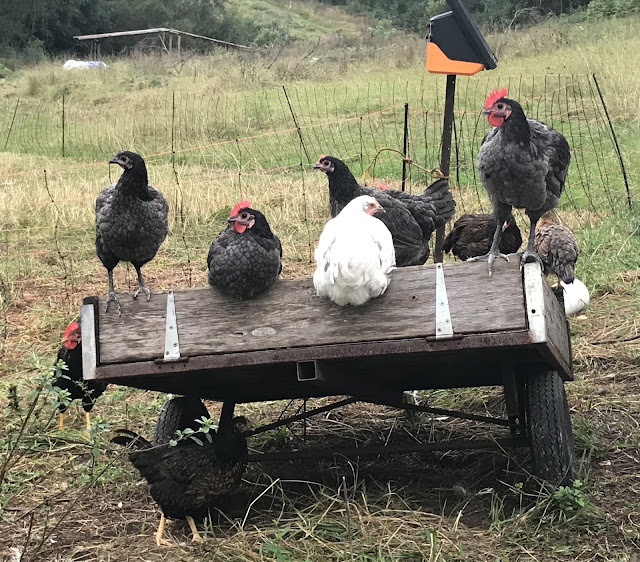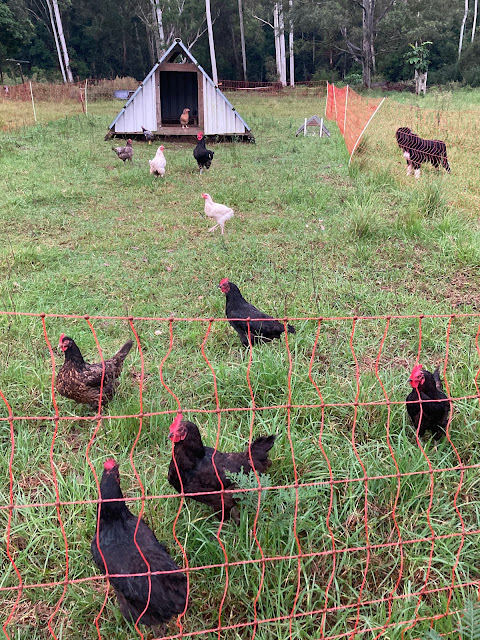What chicken breeds are best?
Looks aside, chickens can be split into three main categories. Egg layers and meat chickens, the third is where my preference lies and that is in heritage breeds which are generally a duel purpose bird.
Your best egg-laying chickens are Hylines and Isa Browns. These are commercial breeds and are bred to turn food into eggs as efficiently as possible and mature to point of lay quickly. When you buy your eggs from the supermarket, you are most likely getting eggs from these breeds.
What do chickens need?
Chickens needs are pretty simple. Most importantly they need shelter from the elements, commonly called a chicken coop. This chicken coop will need to be fully enclosed and secure. In it, they will need comfortable laying boxes with clean bedding like straw or sawdust. The laying boxes should feel private and safe for the hen. Chickens roost at night so they will need perches that can be made from branches.
They also need food, water, dirt to dust bathe in and enough space to carry out their natural chicken behaviour. Adding wormwood and lavender cuttings to their nesting boxes can help to naturally deter fleas and mites.
What do chickens eat?
Chickens are fantastic composters and will happily turn your kitchen scraps into delicious eggs. They can eat a lot of things, but they can't eat uncooked rice and beans, though cooked is fine. They also shouldn't eat raw potato, avocado seeds and skin, onion, garlic, chocolate, citrus or raw potato. Though naturally, chickens will eat meat, it's not advised to feed it to them. Pork should especially be avoided as chickens and pigs can transfer disease to one another.
They will also need good quality feed, which you can buy in bulk from your local fodder store. If you have egg-laying chickens they will need a layers pellet, if you are raising chickens for meat, they will require growers pellets. The fodder store will be able to point you in the right direction if you have any queries or feel overwhelmed by the choice.
It's also good to feed chickens shell grit to ensure they have adequate calcium and to add a glurp of apple cider vinegar(ACV) to their water. ACV helps with natural worm prevention and good gut health. You can buy ACV in bulk at the fodder store too.
Chicken coop and run
Aside from their chicken coop, chickens will need a run in which they can scratch about, stretch their wings, socialize and generally do chicken-y things.
Chickens are tasty and generally defenceless. (Though if you have ever been changed by a rooster, that may be hard to believe...) As a result, there are many things aside from us that like to eat them. Foxes, feral cats, goannas, dingoes, neighbourhood dogs, birds of prey even pythons will happily feast on a chicken dinner if given half a chance. This is why they need a good secure coop which they are locked in overnight. The chicken run should have a fence which is a minimum of 6ft, but we prefer 8ft. Chickens are surprisingly good flyers. We have always built our chicken run with wire dug under the ground to prevent animals from digging/pushing under. We do this by digging a trench around the perimeter, placing the wire in it and then pouring concrete around the bottom. It's time-consuming, but it means the job is done well.
You can keep chickens in poultry netting, but you will need to clip their wings. Our chicken's wings currently need clipping and they are flying in and out to their hearts content, which is far from ideal. We have been using electric poultry netting for the last few years and moving it regularly so the chickens are constantly on fresh pasture, but we are not happy with it. It is great for rotational grazing and pasture health but not for the chicken's safety. We have lost chickens to predators as it doesn't keep them in if we lapse on keeping their wings clipped. Which happens with a big family and lots of other things on the go. It is a good solution for heavy meat birds as they can't fly, as long as you have the space to move them regularly.
This year we will be building a large permanent coop with 8ft fencing and using a deep litter system. Their coop will be able to be opened up into the orchard and the veggie patch during certain times. You can see our plans HERE.
Some people find they need to enclose their coop from above with netting too. Foxes are amazing climbers and will take out an entire flock in a night. We don't tend to get foxes here due to our dogs, so it's not something we have ever worried about. But it's an important consideration.
How long do chickens live?
Different chickens have different life expectancies. Commercial meat breeds have the shortest lifespan and usually need to be processed at the 6-10 week mark. Hylines and Isa Browns generally live between 2-3 years. Some duel-purpose heritage breeds like Australoprs can live 6-10 years, with the added bonus of being meaty enough to process once they finish laying. Though they are better suited to making soup and broth than roasted as the older they are, the tougher they get. But they make a very flavourful and highly nutritious chicken soup
Disadvantages of keeping chickens
Honestly, there are not many disadvantages to keeping chickens if they are well set up, their coop is properly built and their needs are met. It is important to remember if they can escape, they will. They will happily devour and scratch up new seedlings and eat your veggies. But a well-built and properly designed coop will prevent this. If they happen to escape into the neighbours, it is best to placate them with a dozen or so eggs and offer to replace any plants they may have damaged.
If you are in the suburbs, you will need to check your council by-laws and build your coop accordingly. They will likely specify the maximum flock size, and distance the coop needs to be from neighbouring fencelines. Nearly all councils prohibit keeping roosters in the suburbs. They are noisy fellows. You will also need to be aware of keeping their coop clean and odour free.
Food will need to be kept in secure bins to reduce the risk of attracting rodents and chickens should only be fed as much as they can eat. Feeding them excess will attract rats and mice and create a smelly, dirty coop. Which no one wants.
All in all, chickens are wonderful animals. They are funny to watch, great at turning green waste into protein-rich eggs and make wonderful pets for children. But be warned, chickens are so delightful it is highly likely you will end up with more than you intended. Frankly, I am not sure is actually a disadvantage!
Much love,
Emma
xx

















Great post Emma! Thought I'd advise you that another item not to let your chickens come in contact with is avocado skin and seeds, flesh is ok, as the chemical - persin - these contain can cause respiratory problems and your chickens can die. These items are best composted - no chicken access allowed - or buried. We have a black Australorp and she is most consistent in her egg laying compared to the white Leghorn and white Sussex we also have. She is older than them but not as old as the Silver laced Wyandotte which is also a pet.
ReplyDeleteAh thanks, I had intended to put avocado in but forgot. Thanks for the reminder! We are really happy with our Australorps too. They are a good chicken, The meat tends to be a little darker in our experience than a commercial chook, and more flavoursome too. This year I'd like to add in some Araucana's and other hens that lay pretty eggs. Though we will always keep a line of pure Australops to sell to local buyers I think.
ReplyDeleteI love keeping chickens, the eggs always taste great, i have a mixture of Isa Browns with a few Xbreeds thrown in, Buff Orpington & a couple of crossed Wyandottes; couple of years ago I picked up a neighbours chooks, 2 hens & a rooster, 2 which have the lavender colouring, which is very pretty; have only hatched out 1 chicken so far which started out black, then grey & now is getting a bit of buff down it's chest, am also hoping that it will be a hen, has no combs or wattles yet so is looking promising.
ReplyDeletehave thoroughly enjoyed reading your blog again & love the name change
thanx for sharing
They are great fun aren't they? Your flock sounds lovely. Our best mother is a lavender Australop. She's so patient and my favourite hen. Im glad to hear you like the name change, it is a bit daunting to change something so much when people are used to one thing. Ill keep y fingers crossed your chick remains a hen! xx
DeleteSuch a great, informative post!
ReplyDeleteI've always wanted chickens, but somehow they never fit into my life. Or rather, until this house, they didn't fit into my (tiny) yards. We could easily have a big coop now, but we are traveling a few times a year. Can't have animals depending on you if you're away from home often.
Thanks Maggie! Is there a neighbour or teenager who could look after your chickens nearby and they could take the eggs while you were away? If you clean the coop before you go they are pretty self contained creatures. As long as they are in a flock, have a good clean secure coop and have daily food/water they don't really need too much more input unlike a dog or a cat. If not perhaps a season will come where you will be able to get them in the future. they are lovely creatures. xx
Delete